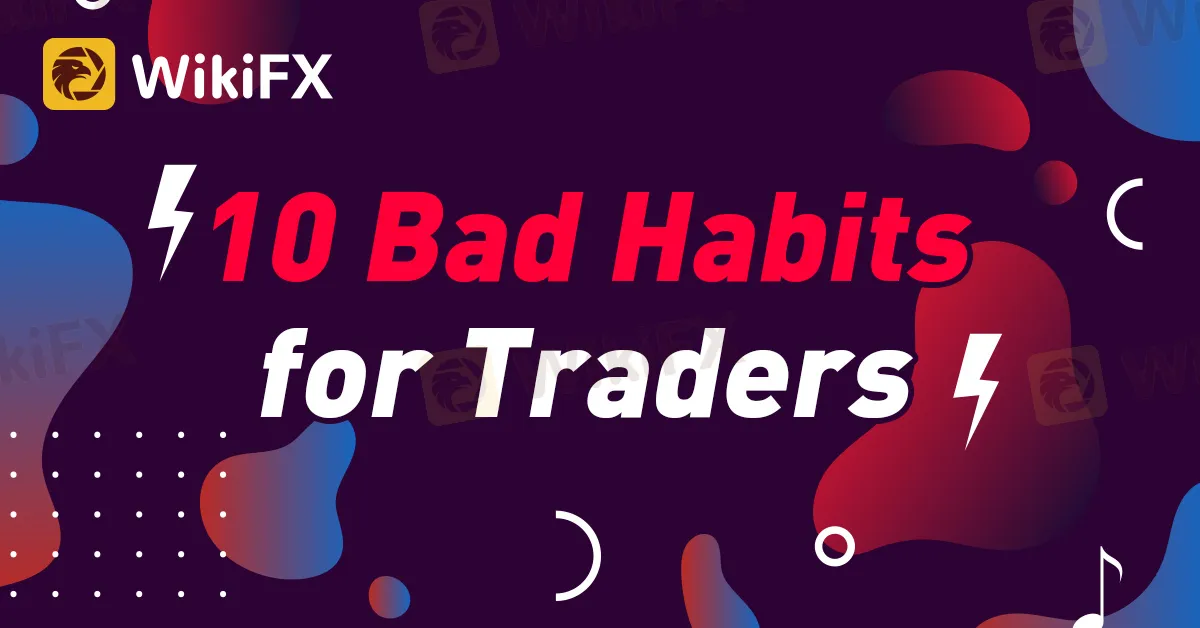简体中文
繁體中文
English
Pусский
日本語
ภาษาไทย
Tiếng Việt
Bahasa Indonesia
Español
हिन्दी
Filippiiniläinen
Français
Deutsch
Português
Türkçe
한국어
العربية
10 Bad Habits for Traders
Abstract:Forex trading can be a highly lucrative venture, but it's also riddled with potential pitfalls. To avoid falling into the trap of bad trading habits, it's essential to be aware of what not to do. Here are ten habits that can lead to failure in forex trading.

Forex trading can be a highly lucrative venture, but it's also riddled with potential pitfalls. To avoid falling into the trap of bad trading habits, it's essential to be aware of what not to do. Here are ten habits that can lead to failure in forex trading.
Lack of Education: Bad traders often enter the market without sufficient knowledge. They fail to understand the intricacies of forex trading, leading to poor decision-making and costly mistakes.
Emotional Trading: Bad traders allow their emotions to dictate their trading decisions. Fear and greed drive impulsive trading, leading to losses and a lack of consistency.
Overtrading: Trading excessively without proper analysis is a common habit among unsuccessful traders. They are often chasing quick profits, leading to excessive risk-taking and a higher chance of failure.
Ignoring Risk Management: Bad traders neglect risk management practices, leading to significant losses. They fail to use stop-loss orders, fail to diversify their portfolios, and risk more than they can afford to lose.
Lack of Patience: Impatient traders jump into trades without waiting for proper confirmation. They lack the discipline to wait for high-probability setups, leading to poor trade entries.
Failure to Adapt: The forex market is dynamic, and bad traders fail to adapt to changing conditions. They stick to outdated strategies, ignore market trends, and refuse to learn from their mistakes.
Blaming External Factors: Bad traders often blame external factors for their losses instead of taking responsibility for their decisions. They attribute losses to market manipulation or broker scams instead of analyzing their own trading mistakes.
Neglecting Analysis: Successful trading requires thorough analysis, but bad traders neglect this aspect. They rely on tips, rumors, or hearsay instead of conducting proper technical and fundamental analysis.
Lack of Record Keeping: Bad traders fail to maintain a trading journal, depriving themselves of valuable insights. They repeat the same mistakes without learning from them, leading to a cycle of losses.
Falling for Scams: Bad traders often fall victim to forex trading scams. They trust unregulated brokers promising unrealistic returns or engage in pyramid schemes that ultimately lead to financial ruin.
To avoid these bad habits, it's crucial to be mindful of your trading decisions, educate yourself, and seek reliable sources of information. One such platform is WikiFX, which provides comprehensive information about forex brokers and user reviews to help traders make informed choices. Visit www.wikifx.com for valuable resources that can protect you from scams and guide you towards successful trading practices.

Disclaimer:
The views in this article only represent the author's personal views, and do not constitute investment advice on this platform. This platform does not guarantee the accuracy, completeness and timeliness of the information in the article, and will not be liable for any loss caused by the use of or reliance on the information in the article.
Read more

Unlocking the Power of Algo Trading: Benefits and Limitation
Algorithmic trading merges speed, data, and automation—but can it outsmart human intuition and market chaos? Explore its power and pitfalls.

Do This ONE Thing to Transform Your Trading Performance Forever
The story is all too familiar. You start trading with high hopes, make some quick profits, and feel like you've finally cracked the code. But then, just as fast as your gains came, they disappear. Your account balance dwindles, and soon you’re left wondering what went wrong. Worse still, fear and confusion creep in, making every new trade a stressful gamble rather than a calculated decision. If this cycle sounds familiar, you’re not alone.

This FREE App Is Helping Millions Avoid Financial Scams
Fraudulent brokers, Ponzi schemes, and deceptive trading platforms are on the rise, making it increasingly difficult to distinguish between legitimate and illicit financial services. Fortunately, there’s a powerful, free tool designed to help users identify and avoid scams before it’s too late—WikiFX.

Forex Explained in 60 Seconds: How It Works & Who Profits
Before diving into the forex market, it’s crucial to understand its mechanics, risks, and profit potential. Without a clear grasp of how forex operates, you risk losing money instead of making it. Here’s a concise breakdown to help you navigate this dynamic financial market.
WikiFX Broker
Latest News
Enlighten Securities Penalized $5 Million as SFC Uncovers Risk Control Failures
Why Are Financial Firms Adopting Stablecoins to Enhance Services and Stability?
Experienced Forex Traders Usually Do This Before Making a Lot of Money
Octa vs XM:Face-Off: A Detailed Comparison
When High Returns Go Wrong: How a Finance Manager Lost RM364,000
Bridging Trust, Exploring Best—WikiEXPO Hong Kong 2025 Wraps Up Spectacularly
Fidelity Investments Explores Stablecoin Innovation in Digital Assets Sector
Interactive Brokers Expands Crypto Trading with Solana, XRP, Cardano, and Dogecoin
SEC Ends Crypto.com Probe, No Action Taken by Regulator
Why More People Are Trading Online Today?
Currency Calculator







